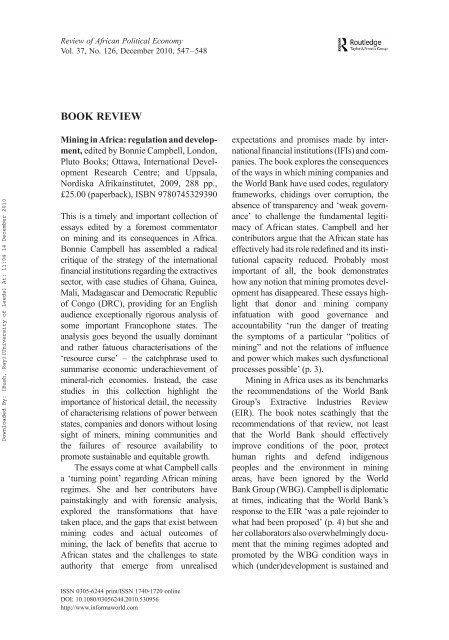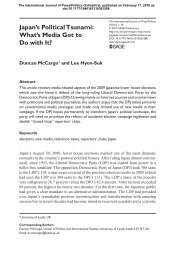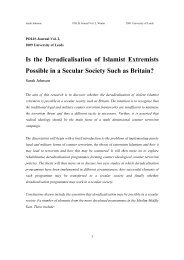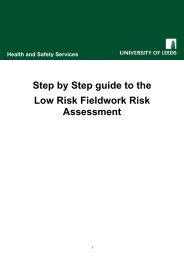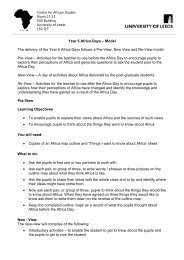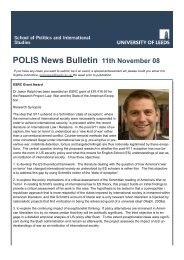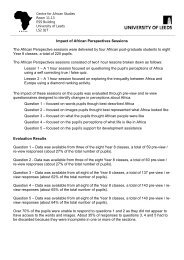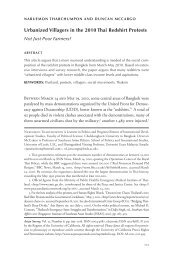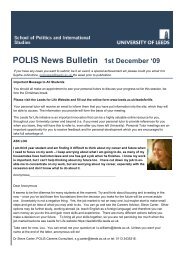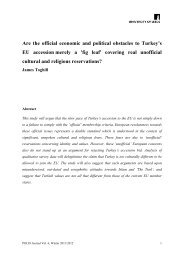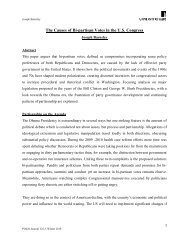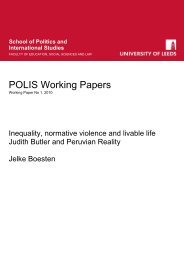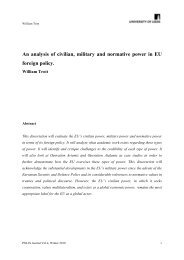Review <strong>of</strong> <strong>Africa</strong>n Political EconomyVol. 37, No. 126, December 2010, 547–548Downloaded By: [Bush, Ray][University <strong>of</strong> Leeds] At: 11:04 14 December 2010BOOK REVIEW<strong>M<strong>in</strong><strong>in</strong>g</strong> <strong>in</strong> <strong>Africa</strong>: <strong>regulation</strong> <strong>and</strong> <strong>development</strong>,edited by Bonnie Campbell, London,Pluto Books; Ottawa, International DevelopmentResearch Centre; <strong>and</strong> Uppsala,Nordiska Afrika<strong>in</strong>stitutet, 2009, 288 pp.,£25.00 (paperback), ISBN 9780745329390This is a timely <strong>and</strong> important collection <strong>of</strong>essays edited by a foremost commentatoron m<strong>in</strong><strong>in</strong>g <strong>and</strong> its consequences <strong>in</strong> <strong>Africa</strong>.Bonnie Campbell has assembled a radicalcritique <strong>of</strong> the strategy <strong>of</strong> the <strong>in</strong>ternationalf<strong>in</strong>ancial <strong>in</strong>stitutions regard<strong>in</strong>g the extractivessector, with case studies <strong>of</strong> Ghana, Gu<strong>in</strong>ea,Mali, Madagascar <strong>and</strong> Democratic Republic<strong>of</strong> Congo (DRC), provid<strong>in</strong>g for an Englishaudience exceptionally rigorous analysis <strong>of</strong>some important Francophone states. Theanalysis goes beyond the usually dom<strong>in</strong>ant<strong>and</strong> rather fatuous characterisations <strong>of</strong> the‘resource curse’ – the catchphrase used tosummarise economic underachievement <strong>of</strong>m<strong>in</strong>eral-rich economies. Instead, the casestudies <strong>in</strong> this collection highlight theimportance <strong>of</strong> historical detail, the necessity<strong>of</strong> characteris<strong>in</strong>g relations <strong>of</strong> power betweenstates, companies <strong>and</strong> donors without los<strong>in</strong>gsight <strong>of</strong> m<strong>in</strong>ers, m<strong>in</strong><strong>in</strong>g communities <strong>and</strong>the failures <strong>of</strong> resource availability topromote susta<strong>in</strong>able <strong>and</strong> equitable growth.The essays come at what Campbell callsa ‘turn<strong>in</strong>g po<strong>in</strong>t’ regard<strong>in</strong>g <strong>Africa</strong>n m<strong>in</strong><strong>in</strong>gregimes. She <strong>and</strong> her contributors havepa<strong>in</strong>stak<strong>in</strong>gly <strong>and</strong> with forensic analysis,explored the transformations that havetaken place, <strong>and</strong> the gaps that exist betweenm<strong>in</strong><strong>in</strong>g codes <strong>and</strong> actual outcomes <strong>of</strong>m<strong>in</strong><strong>in</strong>g, the lack <strong>of</strong> benefits that accrue to<strong>Africa</strong>n states <strong>and</strong> the challenges to stateauthority that emerge from unrealisedexpectations <strong>and</strong> promises made by <strong>in</strong>ternationalf<strong>in</strong>ancial <strong>in</strong>stitutions (IFIs) <strong>and</strong> companies.The book explores the consequences<strong>of</strong> the ways <strong>in</strong> which m<strong>in</strong><strong>in</strong>g companies <strong>and</strong>the World Bank have used codes, regulatoryframeworks, chid<strong>in</strong>gs over corruption, theabsence <strong>of</strong> transparency <strong>and</strong> ‘weak governance’to challenge the fundamental legitimacy<strong>of</strong> <strong>Africa</strong>n states. Campbell <strong>and</strong> hercontributors argue that the <strong>Africa</strong>n state haseffectively had its role redef<strong>in</strong>ed <strong>and</strong> its <strong>in</strong>stitutionalcapacity reduced. Probably mostimportant <strong>of</strong> all, the book demonstrateshow any notion that m<strong>in</strong><strong>in</strong>g promotes <strong>development</strong>has disappeared. These essays highlightthat donor <strong>and</strong> m<strong>in</strong><strong>in</strong>g company<strong>in</strong>fatuation with good governance <strong>and</strong>accountability ‘run the danger <strong>of</strong> treat<strong>in</strong>gthe symptoms <strong>of</strong> a particular “politics <strong>of</strong>m<strong>in</strong><strong>in</strong>g” <strong>and</strong> not the relations <strong>of</strong> <strong>in</strong>fluence<strong>and</strong> power which makes such dysfunctionalprocesses possible’ (p. 3).<strong>M<strong>in</strong><strong>in</strong>g</strong> <strong>in</strong> <strong>Africa</strong> uses as its benchmarksthe recommendations <strong>of</strong> the World BankGroup’s Extractive Industries Review(EIR). The book notes scath<strong>in</strong>gly that therecommendations <strong>of</strong> that review, not leastthat the World Bank should effectivelyimprove conditions <strong>of</strong> the poor, protecthuman rights <strong>and</strong> defend <strong>in</strong>digenouspeoples <strong>and</strong> the environment <strong>in</strong> m<strong>in</strong><strong>in</strong>gareas, have been ignored by the WorldBank Group (WBG). Campbell is diplomaticat times, <strong>in</strong>dicat<strong>in</strong>g that the World Bank’sresponse to the EIR ‘was a pale rejo<strong>in</strong>der towhat had been proposed’ (p. 4) but she <strong>and</strong>her collaborators also overwhelm<strong>in</strong>gly documentthat the m<strong>in</strong><strong>in</strong>g regimes adopted <strong>and</strong>promoted by the WBG condition ways <strong>in</strong>which (under)<strong>development</strong> is susta<strong>in</strong>ed <strong>and</strong>ISSN 0305-6244 pr<strong>in</strong>t/ISSN 1740-1720 onl<strong>in</strong>eDOI: 10.1080/03056244.2010.530956http://www.<strong>in</strong>formaworld.com
Downloaded By: [Bush, Ray][University <strong>of</strong> Leeds] At: 11:04 14 December 2010548 Book reviewreproduced by the extractives sector as it iscurrently organised.The case studies <strong>of</strong> Ghana (Akabzaa),Mali (Belem), Madagascar (Sarras<strong>in</strong>) <strong>and</strong>Democratic Republic <strong>of</strong> Congo (Mazalto)highlight the detail <strong>of</strong> m<strong>in</strong><strong>in</strong>g sectorreforms, promoted <strong>and</strong> <strong>of</strong>ten directed bythe WBG, with the rhetoric <strong>of</strong> improv<strong>in</strong>gliv<strong>in</strong>g conditions, promot<strong>in</strong>g <strong>development</strong><strong>and</strong> transparency, yet the outcomes entrencha <strong>development</strong> model <strong>in</strong>tended to attractforeign direct <strong>in</strong>vestment (FDI). And it isFDI which disables <strong>development</strong>, underm<strong>in</strong><strong>in</strong>gstate authority <strong>and</strong> policy space.In explor<strong>in</strong>g the detail <strong>of</strong> country extractivesector reforms <strong>in</strong> the diverse mix <strong>of</strong>cases, this book is a powerful document <strong>of</strong>the need for a radical <strong>and</strong> dramatic reform<strong>of</strong> the extractives sector. It disproves theidea that companies have embracedmean<strong>in</strong>gful corporate responsibility, <strong>and</strong>demonstrates that the <strong>development</strong> model<strong>of</strong> externalisation <strong>of</strong> <strong>Africa</strong>n economiesmerely serves the <strong>in</strong>terests <strong>of</strong> foreigncapital <strong>and</strong> some local elites, while exacerbat<strong>in</strong>gpoverty <strong>and</strong> <strong>in</strong>equality. The bookargues the need for <strong>Africa</strong>n states <strong>and</strong>m<strong>in</strong><strong>in</strong>g communities to create <strong>and</strong> empowerreform <strong>of</strong> the extractives sector <strong>and</strong> therewas certa<strong>in</strong>ly an opportunity <strong>in</strong> thiscollection, not always used, to highlight theimportance <strong>of</strong> local community strugglesaga<strong>in</strong>st companies <strong>and</strong> states as locallivelihoods became transformed <strong>and</strong> peopledispossessed <strong>of</strong> l<strong>and</strong> <strong>and</strong> opportunity.The <strong>Africa</strong>n Union (AU) is <strong>in</strong> theprocess <strong>of</strong> embrac<strong>in</strong>g its own vision for<strong>Africa</strong>n m<strong>in</strong><strong>in</strong>g (AU 2008) but unfortunately<strong>Africa</strong>n governments rema<strong>in</strong>, itseems, too wedded to donor-driven governanceagendas as the panacea for m<strong>in</strong><strong>in</strong>gsector reform. There seems little energyfor active reformulation <strong>of</strong> strategies forcontrol <strong>and</strong> <strong>regulation</strong> <strong>of</strong> m<strong>in</strong><strong>in</strong>g companiesbut the vision document, AU debate <strong>and</strong> the<strong>in</strong>ternational study group established toexplore policy <strong>in</strong> the extractives sectormay promote a more radical policy <strong>in</strong>itiative.This is certa<strong>in</strong>ly needed.<strong>M<strong>in</strong><strong>in</strong>g</strong> transnational corporations(TNCs) are <strong>in</strong> many respects ‘outriders’ forcapitalism. There may only be five m<strong>in</strong><strong>in</strong>g<strong>and</strong> quarry<strong>in</strong>g TNCs <strong>in</strong> the top 100 companieslisted <strong>in</strong> the 2009 World Investment Report,but they held more than US$250 billion <strong>in</strong>assets <strong>and</strong> more than US$126 billion <strong>in</strong> sales<strong>in</strong> 2008. As a proportion <strong>of</strong> global FDIflows, <strong>in</strong>vestment <strong>in</strong> extractive <strong>in</strong>dustriesmay also be relatively small but m<strong>in</strong><strong>in</strong>gTNC <strong>in</strong>fluence is disproportionate to theirsize. The pr<strong>of</strong>itability <strong>of</strong> extraction <strong>and</strong> sales<strong>of</strong> processed metals <strong>and</strong> precious stones isextremely high. One estimate was that for80% <strong>of</strong> the world metal m<strong>in</strong><strong>in</strong>g <strong>in</strong>dustry, bycapitalisation, net pr<strong>of</strong>its rose from US$4.4billion <strong>in</strong> 2002 to US$67 billion <strong>in</strong> 2006 –the <strong>in</strong>crease <strong>in</strong> pr<strong>of</strong>it between 2005 <strong>and</strong>2006, follow<strong>in</strong>g the spike <strong>in</strong> commodityprices was an extraord<strong>in</strong>ary 64% – this translated<strong>in</strong>to an <strong>in</strong>crease <strong>of</strong> 1423% comparedwith 2002 levels with a return on equity <strong>of</strong>33% compared with 26% <strong>in</strong> 2005 (PricewaterhouseCoopers2007, pp. 3, 5). <strong>M<strong>in</strong><strong>in</strong>g</strong> <strong>in</strong><strong>Africa</strong> provides important build<strong>in</strong>g blocks toconfront the rhetoric <strong>of</strong> the WBG, m<strong>in</strong><strong>in</strong>gTNCs <strong>and</strong> donors that promote FDI as theonly promoter <strong>of</strong> capital accumulation <strong>in</strong><strong>Africa</strong>. <strong>Africa</strong>n resource-dependent statesneed now to embrace the importance <strong>of</strong> thecritical analysis to help deepen a vision form<strong>in</strong><strong>in</strong>g that is a real alternative to the hegemony<strong>of</strong> the IFI <strong>and</strong> TNCs.ReferencesAU, 2008. <strong>Africa</strong>n m<strong>in</strong><strong>in</strong>g vision 2050. <strong>Africa</strong>nUnion Conference <strong>of</strong> M<strong>in</strong>isters Responsiblefor M<strong>in</strong>eral Resources Development, 1stOrd<strong>in</strong>ary Session 13–17 October 2008.Mimeo.PricewaterhouseCoopers, 2007. Metals <strong>and</strong>m<strong>in</strong><strong>in</strong>g: review <strong>of</strong> global trends <strong>in</strong> them<strong>in</strong><strong>in</strong>g <strong>in</strong>dustry. Available from http://www.pwc.com/za/en/publications/global-trends-<strong>in</strong>m<strong>in</strong><strong>in</strong>g-<strong>in</strong>dustry-2007.jhtml[Accessed 6 July2010].Ray BushUniversity <strong>of</strong> Leeds, UKEmail: r.c.bush@leeds.ac.uk# 2010, Ray Bush


